Reflection on Medication Management Error in Clinical Practice
VerifiedAdded on 2020/04/15
|9
|2354
|1390
Report
AI Summary
This report is a reflective analysis by a nursing student on medication management errors encountered during clinical practice, with a specific focus on intravenous (IV) administration. The student identifies gaps between theoretical knowledge and practical application as a significant contributor to errors, highlighting issues such as distractions, workload, and limited hands-on experience with IV devices. The report explores external and internal factors influencing medication errors, including miscommunication, chaotic environments, and inadequate training. It references multiple studies and articles to support the arguments, emphasizing the importance of continuous professional development, evidence-based practice, and adherence to the Nursing and Midwifery Board of Australia (NMBA) standards for patient safety. The student concludes by expressing a commitment to bridging knowledge gaps and prioritizing patient care to avoid medication management errors.
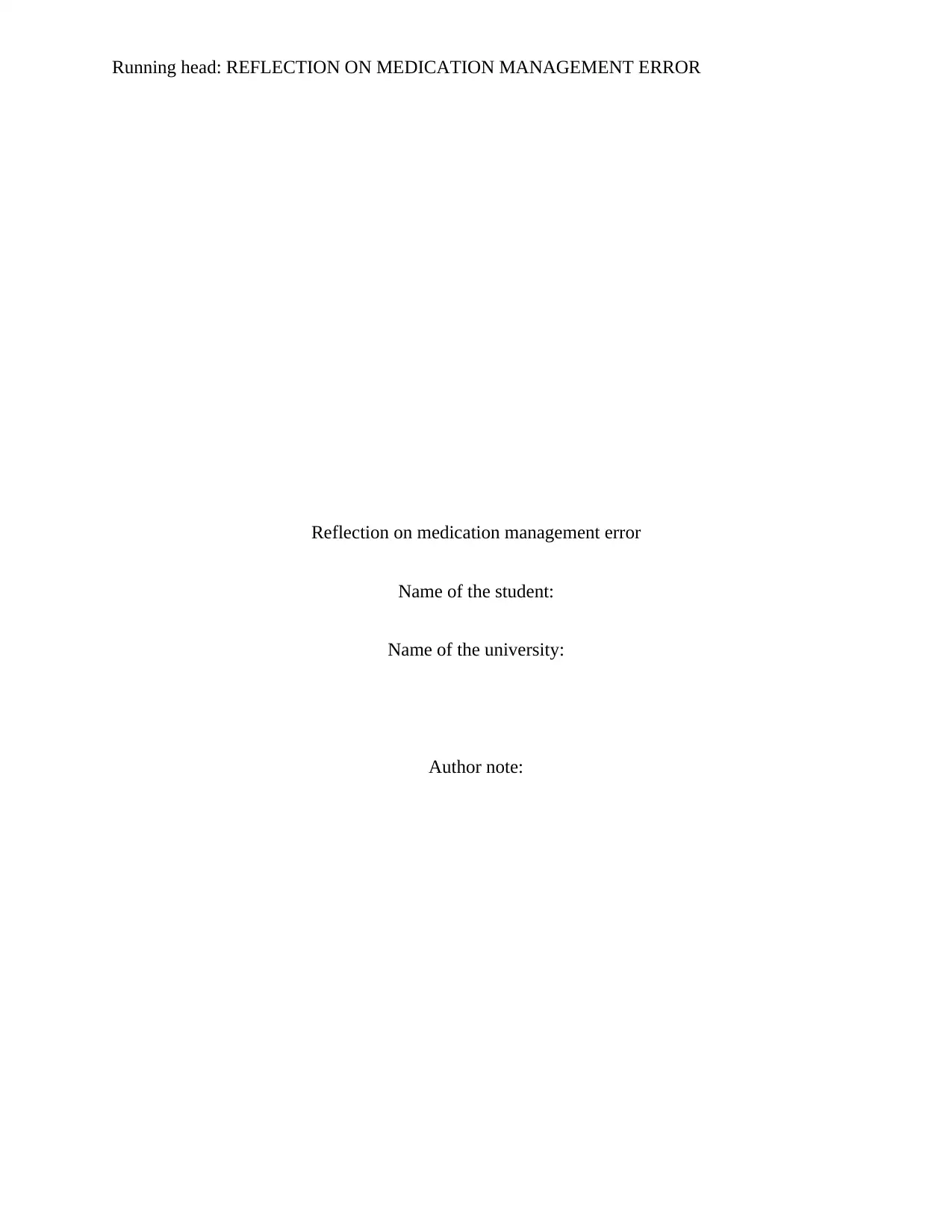
Running head: REFLECTION ON MEDICATION MANAGEMENT ERROR
Reflection on medication management error
Name of the student:
Name of the university:
Author note:
Reflection on medication management error
Name of the student:
Name of the university:
Author note:
Paraphrase This Document
Need a fresh take? Get an instant paraphrase of this document with our AI Paraphraser
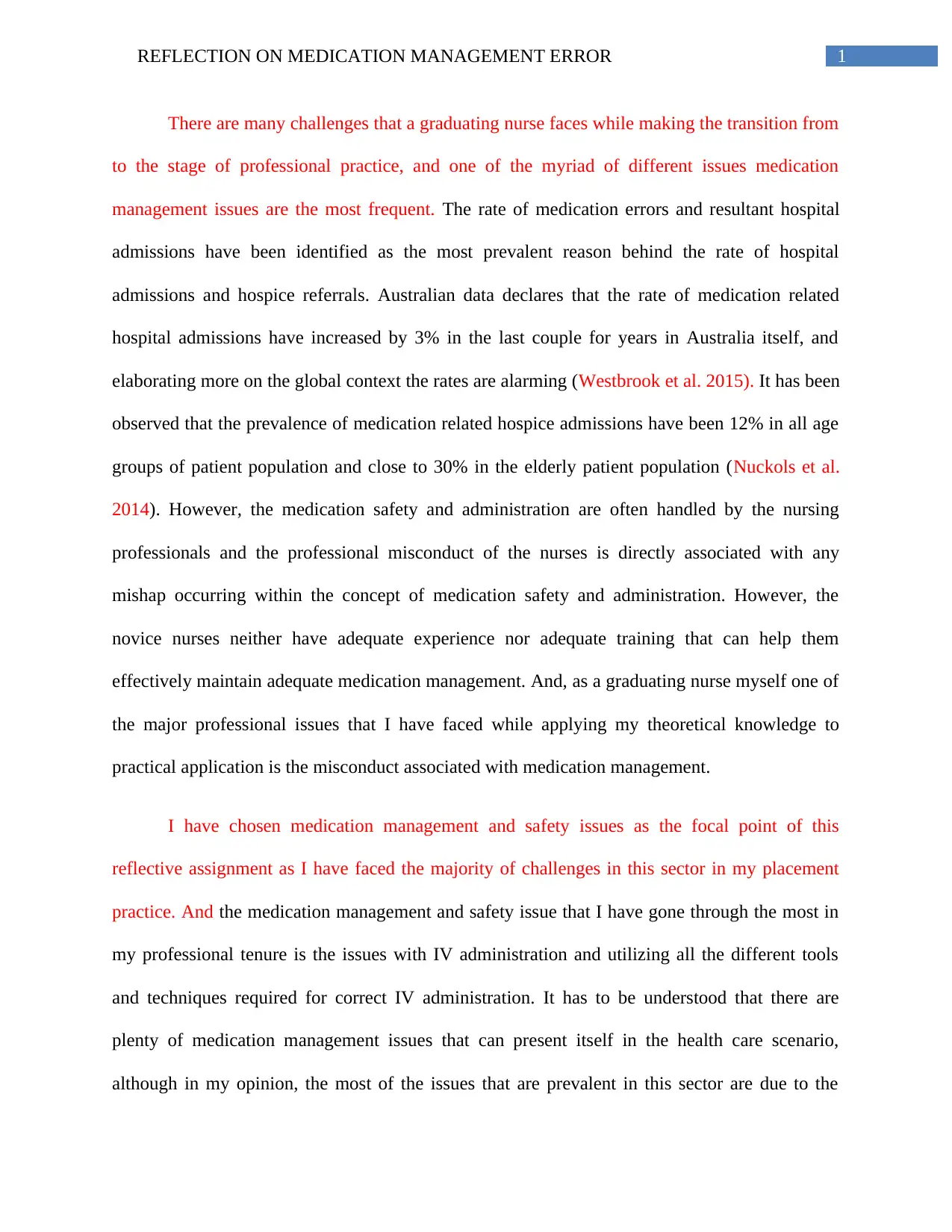
1REFLECTION ON MEDICATION MANAGEMENT ERROR
There are many challenges that a graduating nurse faces while making the transition from
to the stage of professional practice, and one of the myriad of different issues medication
management issues are the most frequent. The rate of medication errors and resultant hospital
admissions have been identified as the most prevalent reason behind the rate of hospital
admissions and hospice referrals. Australian data declares that the rate of medication related
hospital admissions have increased by 3% in the last couple for years in Australia itself, and
elaborating more on the global context the rates are alarming (Westbrook et al. 2015). It has been
observed that the prevalence of medication related hospice admissions have been 12% in all age
groups of patient population and close to 30% in the elderly patient population (Nuckols et al.
2014). However, the medication safety and administration are often handled by the nursing
professionals and the professional misconduct of the nurses is directly associated with any
mishap occurring within the concept of medication safety and administration. However, the
novice nurses neither have adequate experience nor adequate training that can help them
effectively maintain adequate medication management. And, as a graduating nurse myself one of
the major professional issues that I have faced while applying my theoretical knowledge to
practical application is the misconduct associated with medication management.
I have chosen medication management and safety issues as the focal point of this
reflective assignment as I have faced the majority of challenges in this sector in my placement
practice. And the medication management and safety issue that I have gone through the most in
my professional tenure is the issues with IV administration and utilizing all the different tools
and techniques required for correct IV administration. It has to be understood that there are
plenty of medication management issues that can present itself in the health care scenario,
although in my opinion, the most of the issues that are prevalent in this sector are due to the
There are many challenges that a graduating nurse faces while making the transition from
to the stage of professional practice, and one of the myriad of different issues medication
management issues are the most frequent. The rate of medication errors and resultant hospital
admissions have been identified as the most prevalent reason behind the rate of hospital
admissions and hospice referrals. Australian data declares that the rate of medication related
hospital admissions have increased by 3% in the last couple for years in Australia itself, and
elaborating more on the global context the rates are alarming (Westbrook et al. 2015). It has been
observed that the prevalence of medication related hospice admissions have been 12% in all age
groups of patient population and close to 30% in the elderly patient population (Nuckols et al.
2014). However, the medication safety and administration are often handled by the nursing
professionals and the professional misconduct of the nurses is directly associated with any
mishap occurring within the concept of medication safety and administration. However, the
novice nurses neither have adequate experience nor adequate training that can help them
effectively maintain adequate medication management. And, as a graduating nurse myself one of
the major professional issues that I have faced while applying my theoretical knowledge to
practical application is the misconduct associated with medication management.
I have chosen medication management and safety issues as the focal point of this
reflective assignment as I have faced the majority of challenges in this sector in my placement
practice. And the medication management and safety issue that I have gone through the most in
my professional tenure is the issues with IV administration and utilizing all the different tools
and techniques required for correct IV administration. It has to be understood that there are
plenty of medication management issues that can present itself in the health care scenario,
although in my opinion, the most of the issues that are prevalent in this sector are due to the
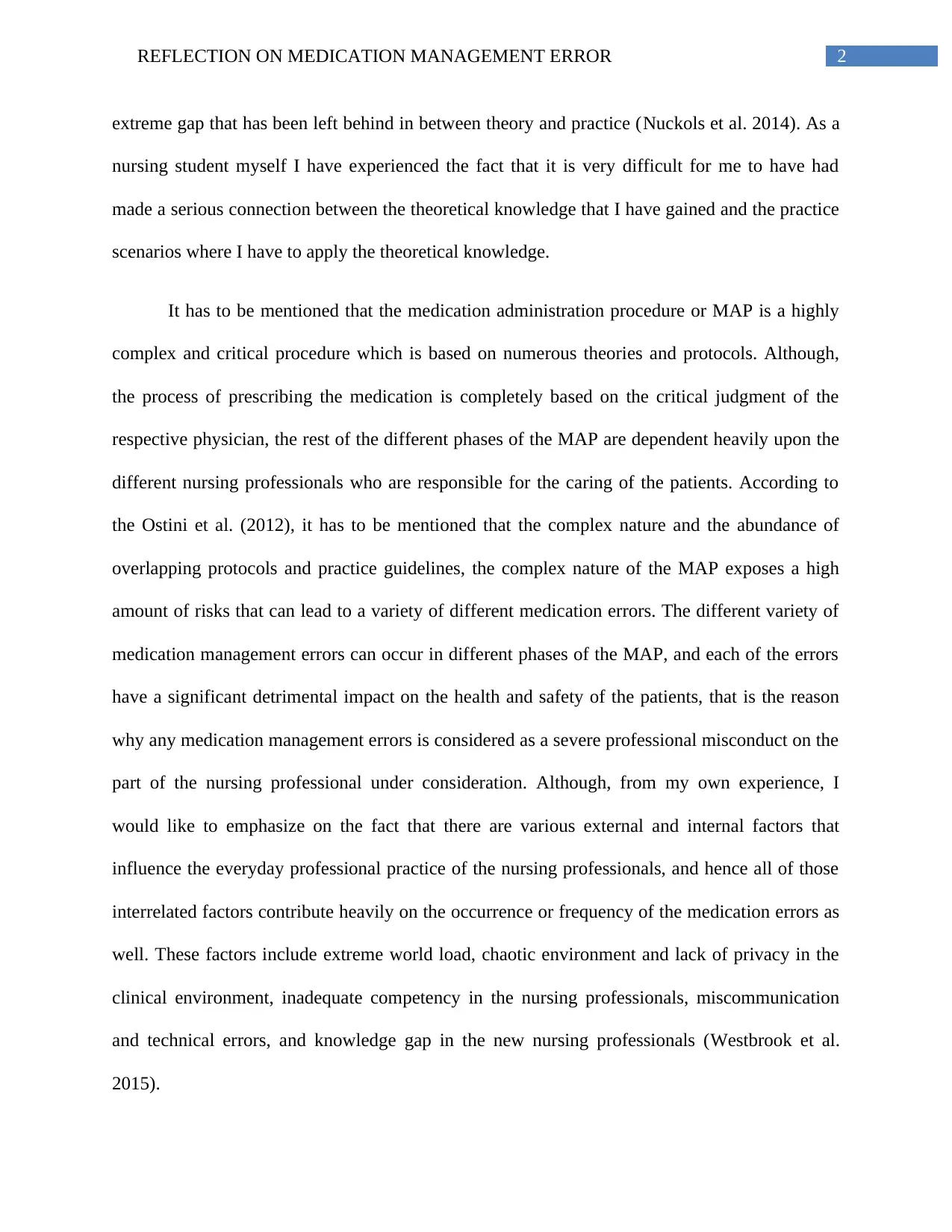
2REFLECTION ON MEDICATION MANAGEMENT ERROR
extreme gap that has been left behind in between theory and practice (Nuckols et al. 2014). As a
nursing student myself I have experienced the fact that it is very difficult for me to have had
made a serious connection between the theoretical knowledge that I have gained and the practice
scenarios where I have to apply the theoretical knowledge.
It has to be mentioned that the medication administration procedure or MAP is a highly
complex and critical procedure which is based on numerous theories and protocols. Although,
the process of prescribing the medication is completely based on the critical judgment of the
respective physician, the rest of the different phases of the MAP are dependent heavily upon the
different nursing professionals who are responsible for the caring of the patients. According to
the Ostini et al. (2012), it has to be mentioned that the complex nature and the abundance of
overlapping protocols and practice guidelines, the complex nature of the MAP exposes a high
amount of risks that can lead to a variety of different medication errors. The different variety of
medication management errors can occur in different phases of the MAP, and each of the errors
have a significant detrimental impact on the health and safety of the patients, that is the reason
why any medication management errors is considered as a severe professional misconduct on the
part of the nursing professional under consideration. Although, from my own experience, I
would like to emphasize on the fact that there are various external and internal factors that
influence the everyday professional practice of the nursing professionals, and hence all of those
interrelated factors contribute heavily on the occurrence or frequency of the medication errors as
well. These factors include extreme world load, chaotic environment and lack of privacy in the
clinical environment, inadequate competency in the nursing professionals, miscommunication
and technical errors, and knowledge gap in the new nursing professionals (Westbrook et al.
2015).
extreme gap that has been left behind in between theory and practice (Nuckols et al. 2014). As a
nursing student myself I have experienced the fact that it is very difficult for me to have had
made a serious connection between the theoretical knowledge that I have gained and the practice
scenarios where I have to apply the theoretical knowledge.
It has to be mentioned that the medication administration procedure or MAP is a highly
complex and critical procedure which is based on numerous theories and protocols. Although,
the process of prescribing the medication is completely based on the critical judgment of the
respective physician, the rest of the different phases of the MAP are dependent heavily upon the
different nursing professionals who are responsible for the caring of the patients. According to
the Ostini et al. (2012), it has to be mentioned that the complex nature and the abundance of
overlapping protocols and practice guidelines, the complex nature of the MAP exposes a high
amount of risks that can lead to a variety of different medication errors. The different variety of
medication management errors can occur in different phases of the MAP, and each of the errors
have a significant detrimental impact on the health and safety of the patients, that is the reason
why any medication management errors is considered as a severe professional misconduct on the
part of the nursing professional under consideration. Although, from my own experience, I
would like to emphasize on the fact that there are various external and internal factors that
influence the everyday professional practice of the nursing professionals, and hence all of those
interrelated factors contribute heavily on the occurrence or frequency of the medication errors as
well. These factors include extreme world load, chaotic environment and lack of privacy in the
clinical environment, inadequate competency in the nursing professionals, miscommunication
and technical errors, and knowledge gap in the new nursing professionals (Westbrook et al.
2015).
⊘ This is a preview!⊘
Do you want full access?
Subscribe today to unlock all pages.

Trusted by 1+ million students worldwide
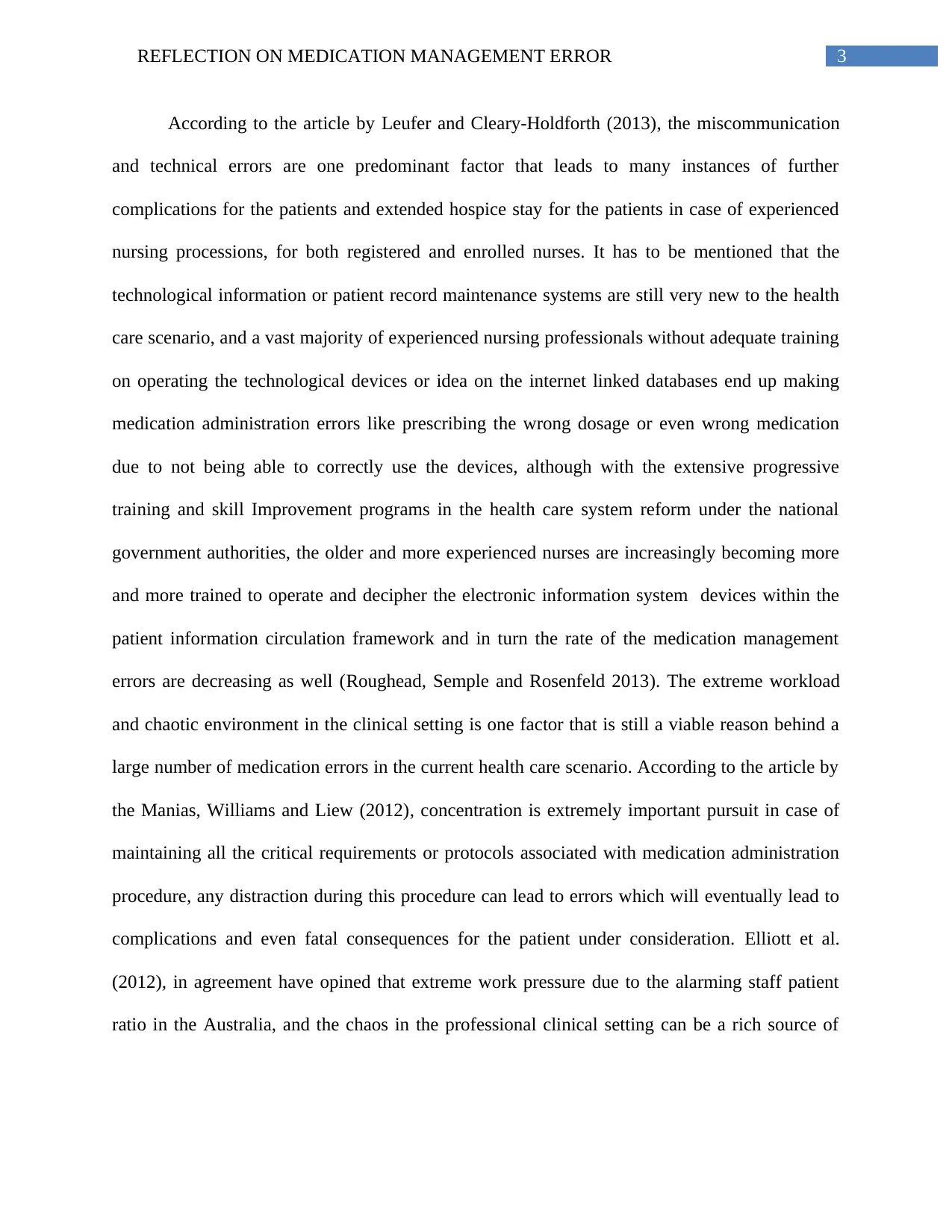
3REFLECTION ON MEDICATION MANAGEMENT ERROR
According to the article by Leufer and Cleary-Holdforth (2013), the miscommunication
and technical errors are one predominant factor that leads to many instances of further
complications for the patients and extended hospice stay for the patients in case of experienced
nursing processions, for both registered and enrolled nurses. It has to be mentioned that the
technological information or patient record maintenance systems are still very new to the health
care scenario, and a vast majority of experienced nursing professionals without adequate training
on operating the technological devices or idea on the internet linked databases end up making
medication administration errors like prescribing the wrong dosage or even wrong medication
due to not being able to correctly use the devices, although with the extensive progressive
training and skill Improvement programs in the health care system reform under the national
government authorities, the older and more experienced nurses are increasingly becoming more
and more trained to operate and decipher the electronic information system devices within the
patient information circulation framework and in turn the rate of the medication management
errors are decreasing as well (Roughead, Semple and Rosenfeld 2013). The extreme workload
and chaotic environment in the clinical setting is one factor that is still a viable reason behind a
large number of medication errors in the current health care scenario. According to the article by
the Manias, Williams and Liew (2012), concentration is extremely important pursuit in case of
maintaining all the critical requirements or protocols associated with medication administration
procedure, any distraction during this procedure can lead to errors which will eventually lead to
complications and even fatal consequences for the patient under consideration. Elliott et al.
(2012), in agreement have opined that extreme work pressure due to the alarming staff patient
ratio in the Australia, and the chaos in the professional clinical setting can be a rich source of
According to the article by Leufer and Cleary-Holdforth (2013), the miscommunication
and technical errors are one predominant factor that leads to many instances of further
complications for the patients and extended hospice stay for the patients in case of experienced
nursing processions, for both registered and enrolled nurses. It has to be mentioned that the
technological information or patient record maintenance systems are still very new to the health
care scenario, and a vast majority of experienced nursing professionals without adequate training
on operating the technological devices or idea on the internet linked databases end up making
medication administration errors like prescribing the wrong dosage or even wrong medication
due to not being able to correctly use the devices, although with the extensive progressive
training and skill Improvement programs in the health care system reform under the national
government authorities, the older and more experienced nurses are increasingly becoming more
and more trained to operate and decipher the electronic information system devices within the
patient information circulation framework and in turn the rate of the medication management
errors are decreasing as well (Roughead, Semple and Rosenfeld 2013). The extreme workload
and chaotic environment in the clinical setting is one factor that is still a viable reason behind a
large number of medication errors in the current health care scenario. According to the article by
the Manias, Williams and Liew (2012), concentration is extremely important pursuit in case of
maintaining all the critical requirements or protocols associated with medication administration
procedure, any distraction during this procedure can lead to errors which will eventually lead to
complications and even fatal consequences for the patient under consideration. Elliott et al.
(2012), in agreement have opined that extreme work pressure due to the alarming staff patient
ratio in the Australia, and the chaos in the professional clinical setting can be a rich source of
Paraphrase This Document
Need a fresh take? Get an instant paraphrase of this document with our AI Paraphraser
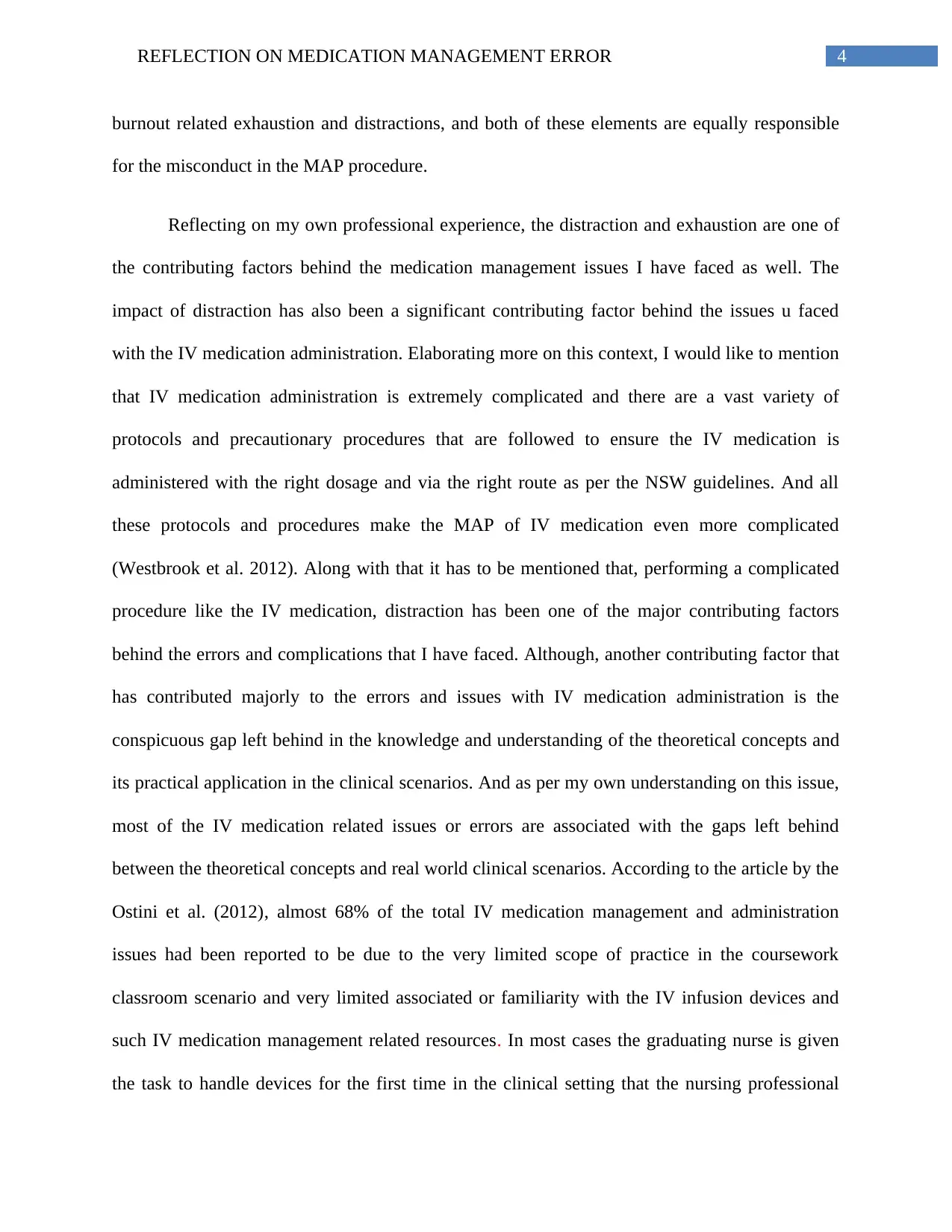
4REFLECTION ON MEDICATION MANAGEMENT ERROR
burnout related exhaustion and distractions, and both of these elements are equally responsible
for the misconduct in the MAP procedure.
Reflecting on my own professional experience, the distraction and exhaustion are one of
the contributing factors behind the medication management issues I have faced as well. The
impact of distraction has also been a significant contributing factor behind the issues u faced
with the IV medication administration. Elaborating more on this context, I would like to mention
that IV medication administration is extremely complicated and there are a vast variety of
protocols and precautionary procedures that are followed to ensure the IV medication is
administered with the right dosage and via the right route as per the NSW guidelines. And all
these protocols and procedures make the MAP of IV medication even more complicated
(Westbrook et al. 2012). Along with that it has to be mentioned that, performing a complicated
procedure like the IV medication, distraction has been one of the major contributing factors
behind the errors and complications that I have faced. Although, another contributing factor that
has contributed majorly to the errors and issues with IV medication administration is the
conspicuous gap left behind in the knowledge and understanding of the theoretical concepts and
its practical application in the clinical scenarios. And as per my own understanding on this issue,
most of the IV medication related issues or errors are associated with the gaps left behind
between the theoretical concepts and real world clinical scenarios. According to the article by the
Ostini et al. (2012), almost 68% of the total IV medication management and administration
issues had been reported to be due to the very limited scope of practice in the coursework
classroom scenario and very limited associated or familiarity with the IV infusion devices and
such IV medication management related resources. In most cases the graduating nurse is given
the task to handle devices for the first time in the clinical setting that the nursing professional
burnout related exhaustion and distractions, and both of these elements are equally responsible
for the misconduct in the MAP procedure.
Reflecting on my own professional experience, the distraction and exhaustion are one of
the contributing factors behind the medication management issues I have faced as well. The
impact of distraction has also been a significant contributing factor behind the issues u faced
with the IV medication administration. Elaborating more on this context, I would like to mention
that IV medication administration is extremely complicated and there are a vast variety of
protocols and precautionary procedures that are followed to ensure the IV medication is
administered with the right dosage and via the right route as per the NSW guidelines. And all
these protocols and procedures make the MAP of IV medication even more complicated
(Westbrook et al. 2012). Along with that it has to be mentioned that, performing a complicated
procedure like the IV medication, distraction has been one of the major contributing factors
behind the errors and complications that I have faced. Although, another contributing factor that
has contributed majorly to the errors and issues with IV medication administration is the
conspicuous gap left behind in the knowledge and understanding of the theoretical concepts and
its practical application in the clinical scenarios. And as per my own understanding on this issue,
most of the IV medication related issues or errors are associated with the gaps left behind
between the theoretical concepts and real world clinical scenarios. According to the article by the
Ostini et al. (2012), almost 68% of the total IV medication management and administration
issues had been reported to be due to the very limited scope of practice in the coursework
classroom scenario and very limited associated or familiarity with the IV infusion devices and
such IV medication management related resources. In most cases the graduating nurse is given
the task to handle devices for the first time in the clinical setting that the nursing professional
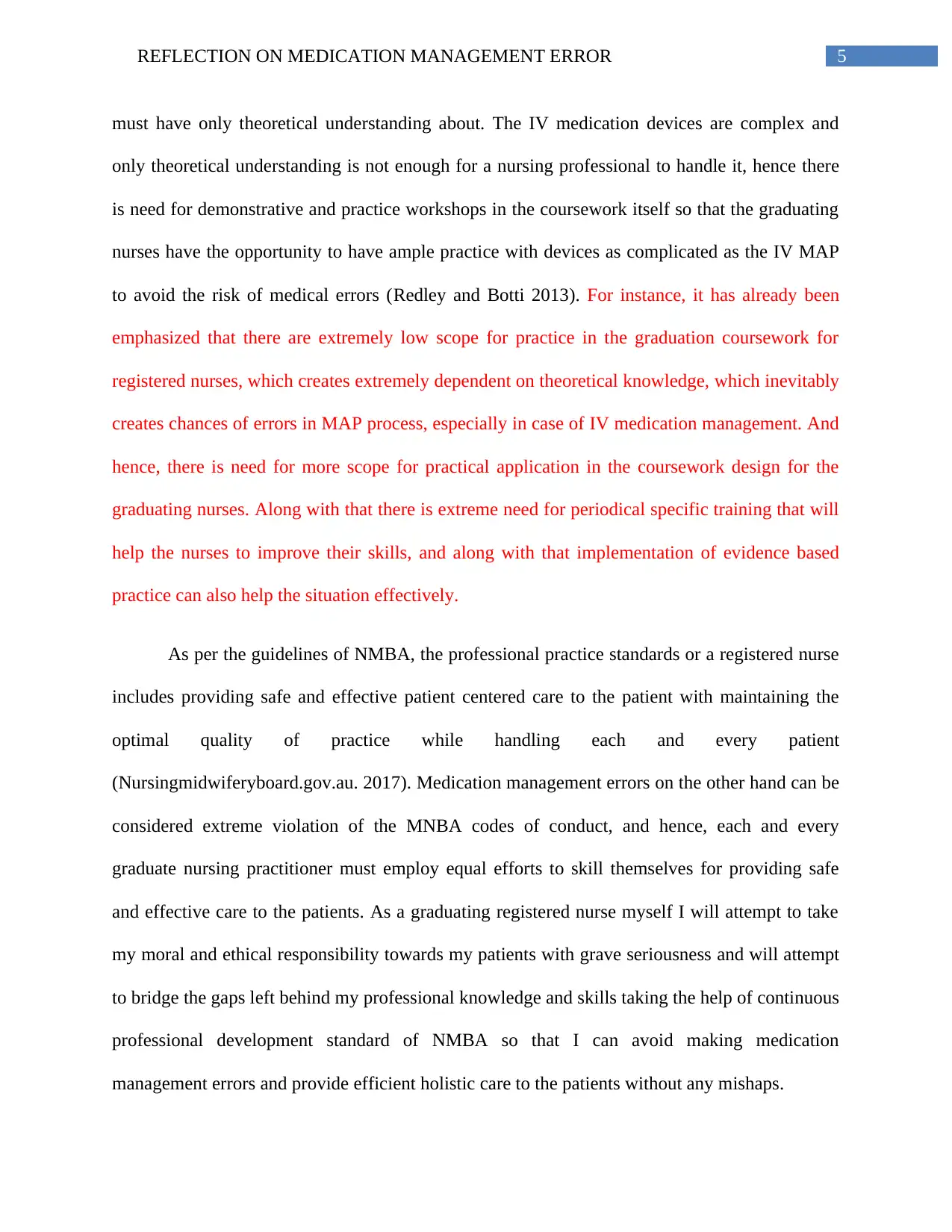
5REFLECTION ON MEDICATION MANAGEMENT ERROR
must have only theoretical understanding about. The IV medication devices are complex and
only theoretical understanding is not enough for a nursing professional to handle it, hence there
is need for demonstrative and practice workshops in the coursework itself so that the graduating
nurses have the opportunity to have ample practice with devices as complicated as the IV MAP
to avoid the risk of medical errors (Redley and Botti 2013). For instance, it has already been
emphasized that there are extremely low scope for practice in the graduation coursework for
registered nurses, which creates extremely dependent on theoretical knowledge, which inevitably
creates chances of errors in MAP process, especially in case of IV medication management. And
hence, there is need for more scope for practical application in the coursework design for the
graduating nurses. Along with that there is extreme need for periodical specific training that will
help the nurses to improve their skills, and along with that implementation of evidence based
practice can also help the situation effectively.
As per the guidelines of NMBA, the professional practice standards or a registered nurse
includes providing safe and effective patient centered care to the patient with maintaining the
optimal quality of practice while handling each and every patient
(Nursingmidwiferyboard.gov.au. 2017). Medication management errors on the other hand can be
considered extreme violation of the MNBA codes of conduct, and hence, each and every
graduate nursing practitioner must employ equal efforts to skill themselves for providing safe
and effective care to the patients. As a graduating registered nurse myself I will attempt to take
my moral and ethical responsibility towards my patients with grave seriousness and will attempt
to bridge the gaps left behind my professional knowledge and skills taking the help of continuous
professional development standard of NMBA so that I can avoid making medication
management errors and provide efficient holistic care to the patients without any mishaps.
must have only theoretical understanding about. The IV medication devices are complex and
only theoretical understanding is not enough for a nursing professional to handle it, hence there
is need for demonstrative and practice workshops in the coursework itself so that the graduating
nurses have the opportunity to have ample practice with devices as complicated as the IV MAP
to avoid the risk of medical errors (Redley and Botti 2013). For instance, it has already been
emphasized that there are extremely low scope for practice in the graduation coursework for
registered nurses, which creates extremely dependent on theoretical knowledge, which inevitably
creates chances of errors in MAP process, especially in case of IV medication management. And
hence, there is need for more scope for practical application in the coursework design for the
graduating nurses. Along with that there is extreme need for periodical specific training that will
help the nurses to improve their skills, and along with that implementation of evidence based
practice can also help the situation effectively.
As per the guidelines of NMBA, the professional practice standards or a registered nurse
includes providing safe and effective patient centered care to the patient with maintaining the
optimal quality of practice while handling each and every patient
(Nursingmidwiferyboard.gov.au. 2017). Medication management errors on the other hand can be
considered extreme violation of the MNBA codes of conduct, and hence, each and every
graduate nursing practitioner must employ equal efforts to skill themselves for providing safe
and effective care to the patients. As a graduating registered nurse myself I will attempt to take
my moral and ethical responsibility towards my patients with grave seriousness and will attempt
to bridge the gaps left behind my professional knowledge and skills taking the help of continuous
professional development standard of NMBA so that I can avoid making medication
management errors and provide efficient holistic care to the patients without any mishaps.
⊘ This is a preview!⊘
Do you want full access?
Subscribe today to unlock all pages.

Trusted by 1+ million students worldwide
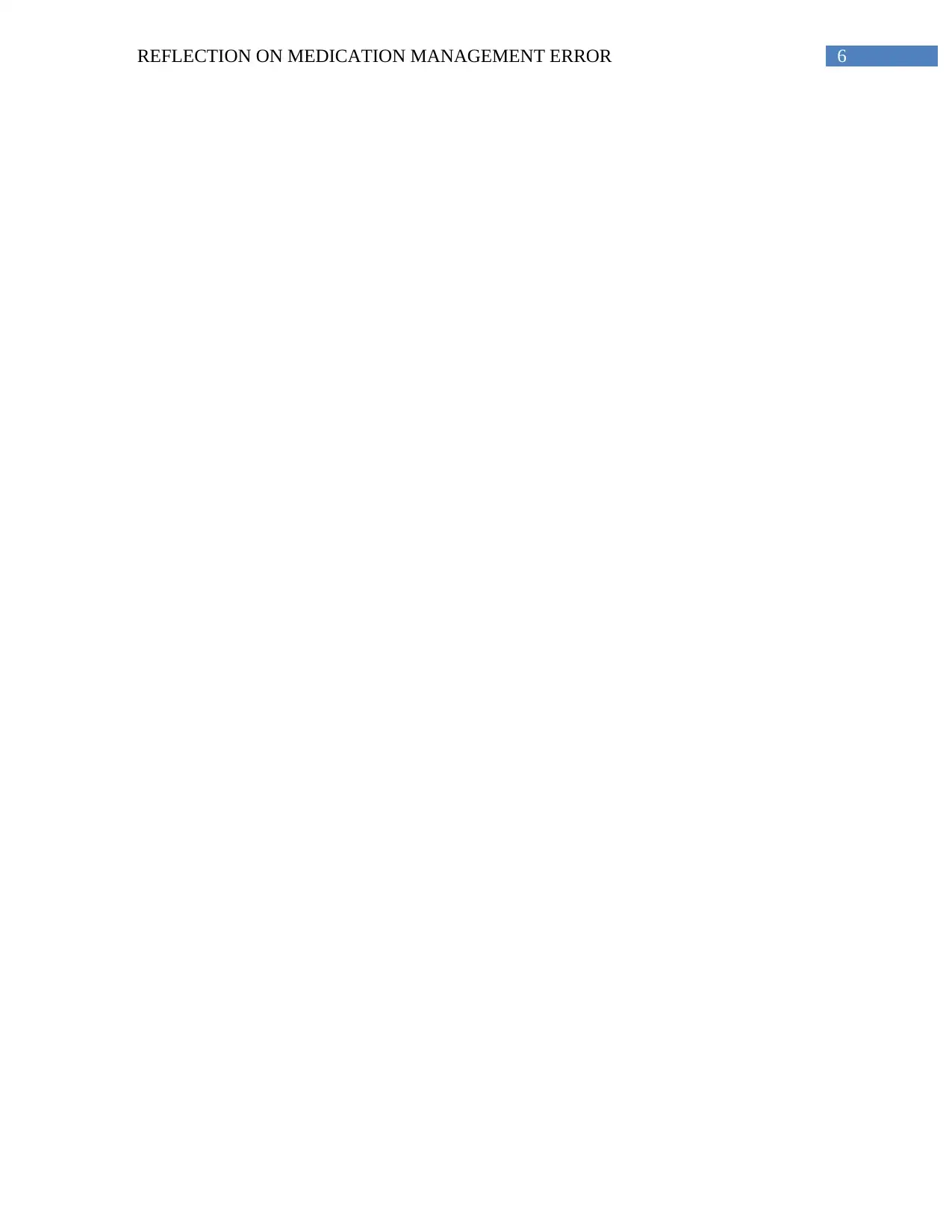
6REFLECTION ON MEDICATION MANAGEMENT ERROR
Paraphrase This Document
Need a fresh take? Get an instant paraphrase of this document with our AI Paraphraser
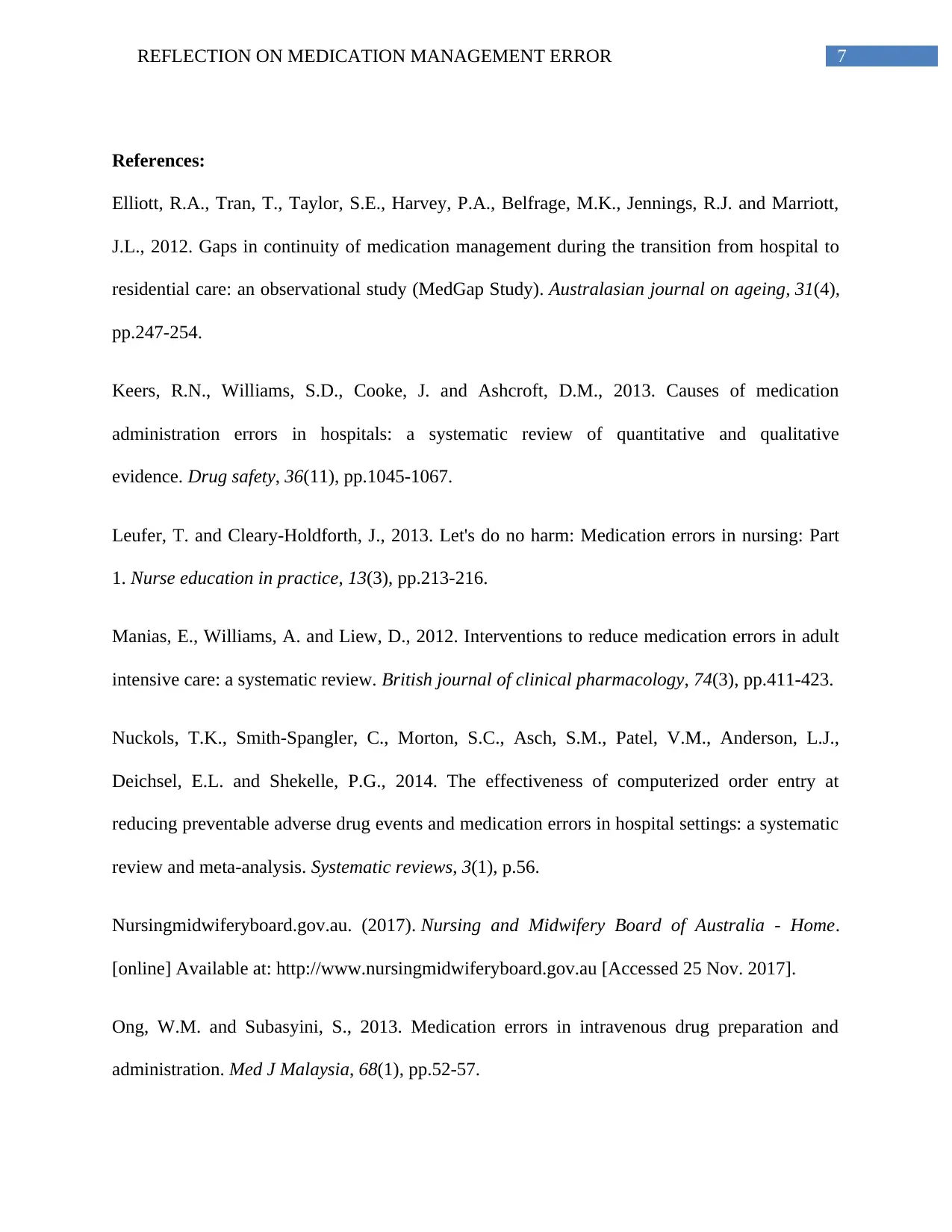
7REFLECTION ON MEDICATION MANAGEMENT ERROR
References:
Elliott, R.A., Tran, T., Taylor, S.E., Harvey, P.A., Belfrage, M.K., Jennings, R.J. and Marriott,
J.L., 2012. Gaps in continuity of medication management during the transition from hospital to
residential care: an observational study (MedGap Study). Australasian journal on ageing, 31(4),
pp.247-254.
Keers, R.N., Williams, S.D., Cooke, J. and Ashcroft, D.M., 2013. Causes of medication
administration errors in hospitals: a systematic review of quantitative and qualitative
evidence. Drug safety, 36(11), pp.1045-1067.
Leufer, T. and Cleary-Holdforth, J., 2013. Let's do no harm: Medication errors in nursing: Part
1. Nurse education in practice, 13(3), pp.213-216.
Manias, E., Williams, A. and Liew, D., 2012. Interventions to reduce medication errors in adult
intensive care: a systematic review. British journal of clinical pharmacology, 74(3), pp.411-423.
Nuckols, T.K., Smith-Spangler, C., Morton, S.C., Asch, S.M., Patel, V.M., Anderson, L.J.,
Deichsel, E.L. and Shekelle, P.G., 2014. The effectiveness of computerized order entry at
reducing preventable adverse drug events and medication errors in hospital settings: a systematic
review and meta-analysis. Systematic reviews, 3(1), p.56.
Nursingmidwiferyboard.gov.au. (2017). Nursing and Midwifery Board of Australia - Home.
[online] Available at: http://www.nursingmidwiferyboard.gov.au [Accessed 25 Nov. 2017].
Ong, W.M. and Subasyini, S., 2013. Medication errors in intravenous drug preparation and
administration. Med J Malaysia, 68(1), pp.52-57.
References:
Elliott, R.A., Tran, T., Taylor, S.E., Harvey, P.A., Belfrage, M.K., Jennings, R.J. and Marriott,
J.L., 2012. Gaps in continuity of medication management during the transition from hospital to
residential care: an observational study (MedGap Study). Australasian journal on ageing, 31(4),
pp.247-254.
Keers, R.N., Williams, S.D., Cooke, J. and Ashcroft, D.M., 2013. Causes of medication
administration errors in hospitals: a systematic review of quantitative and qualitative
evidence. Drug safety, 36(11), pp.1045-1067.
Leufer, T. and Cleary-Holdforth, J., 2013. Let's do no harm: Medication errors in nursing: Part
1. Nurse education in practice, 13(3), pp.213-216.
Manias, E., Williams, A. and Liew, D., 2012. Interventions to reduce medication errors in adult
intensive care: a systematic review. British journal of clinical pharmacology, 74(3), pp.411-423.
Nuckols, T.K., Smith-Spangler, C., Morton, S.C., Asch, S.M., Patel, V.M., Anderson, L.J.,
Deichsel, E.L. and Shekelle, P.G., 2014. The effectiveness of computerized order entry at
reducing preventable adverse drug events and medication errors in hospital settings: a systematic
review and meta-analysis. Systematic reviews, 3(1), p.56.
Nursingmidwiferyboard.gov.au. (2017). Nursing and Midwifery Board of Australia - Home.
[online] Available at: http://www.nursingmidwiferyboard.gov.au [Accessed 25 Nov. 2017].
Ong, W.M. and Subasyini, S., 2013. Medication errors in intravenous drug preparation and
administration. Med J Malaysia, 68(1), pp.52-57.
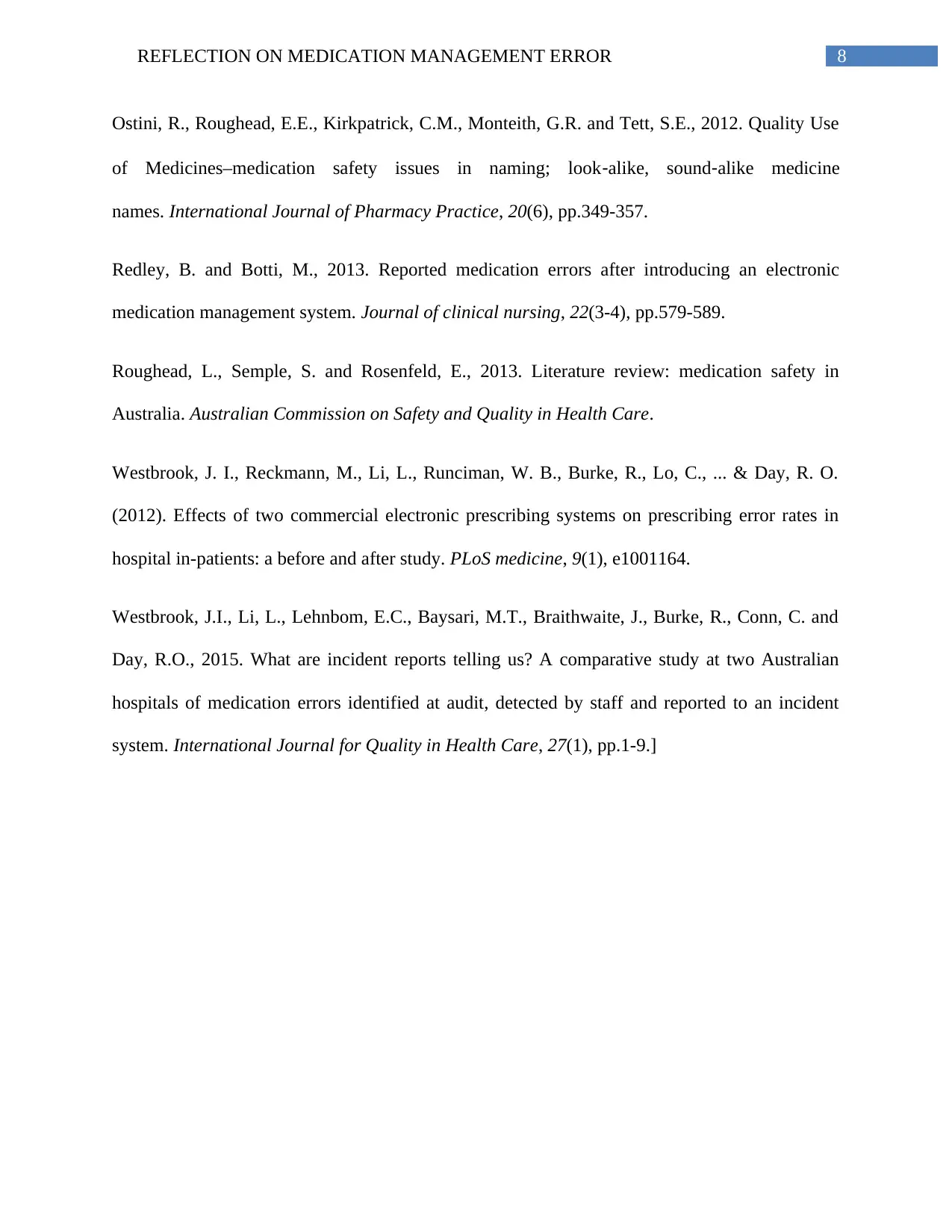
8REFLECTION ON MEDICATION MANAGEMENT ERROR
Ostini, R., Roughead, E.E., Kirkpatrick, C.M., Monteith, G.R. and Tett, S.E., 2012. Quality Use
of Medicines–medication safety issues in naming; look‐alike, sound‐alike medicine
names. International Journal of Pharmacy Practice, 20(6), pp.349-357.
Redley, B. and Botti, M., 2013. Reported medication errors after introducing an electronic
medication management system. Journal of clinical nursing, 22(3-4), pp.579-589.
Roughead, L., Semple, S. and Rosenfeld, E., 2013. Literature review: medication safety in
Australia. Australian Commission on Safety and Quality in Health Care.
Westbrook, J. I., Reckmann, M., Li, L., Runciman, W. B., Burke, R., Lo, C., ... & Day, R. O.
(2012). Effects of two commercial electronic prescribing systems on prescribing error rates in
hospital in-patients: a before and after study. PLoS medicine, 9(1), e1001164.
Westbrook, J.I., Li, L., Lehnbom, E.C., Baysari, M.T., Braithwaite, J., Burke, R., Conn, C. and
Day, R.O., 2015. What are incident reports telling us? A comparative study at two Australian
hospitals of medication errors identified at audit, detected by staff and reported to an incident
system. International Journal for Quality in Health Care, 27(1), pp.1-9.]
Ostini, R., Roughead, E.E., Kirkpatrick, C.M., Monteith, G.R. and Tett, S.E., 2012. Quality Use
of Medicines–medication safety issues in naming; look‐alike, sound‐alike medicine
names. International Journal of Pharmacy Practice, 20(6), pp.349-357.
Redley, B. and Botti, M., 2013. Reported medication errors after introducing an electronic
medication management system. Journal of clinical nursing, 22(3-4), pp.579-589.
Roughead, L., Semple, S. and Rosenfeld, E., 2013. Literature review: medication safety in
Australia. Australian Commission on Safety and Quality in Health Care.
Westbrook, J. I., Reckmann, M., Li, L., Runciman, W. B., Burke, R., Lo, C., ... & Day, R. O.
(2012). Effects of two commercial electronic prescribing systems on prescribing error rates in
hospital in-patients: a before and after study. PLoS medicine, 9(1), e1001164.
Westbrook, J.I., Li, L., Lehnbom, E.C., Baysari, M.T., Braithwaite, J., Burke, R., Conn, C. and
Day, R.O., 2015. What are incident reports telling us? A comparative study at two Australian
hospitals of medication errors identified at audit, detected by staff and reported to an incident
system. International Journal for Quality in Health Care, 27(1), pp.1-9.]
⊘ This is a preview!⊘
Do you want full access?
Subscribe today to unlock all pages.

Trusted by 1+ million students worldwide
1 out of 9
Related Documents
Your All-in-One AI-Powered Toolkit for Academic Success.
+13062052269
info@desklib.com
Available 24*7 on WhatsApp / Email
![[object Object]](/_next/static/media/star-bottom.7253800d.svg)
Unlock your academic potential
Copyright © 2020–2026 A2Z Services. All Rights Reserved. Developed and managed by ZUCOL.





